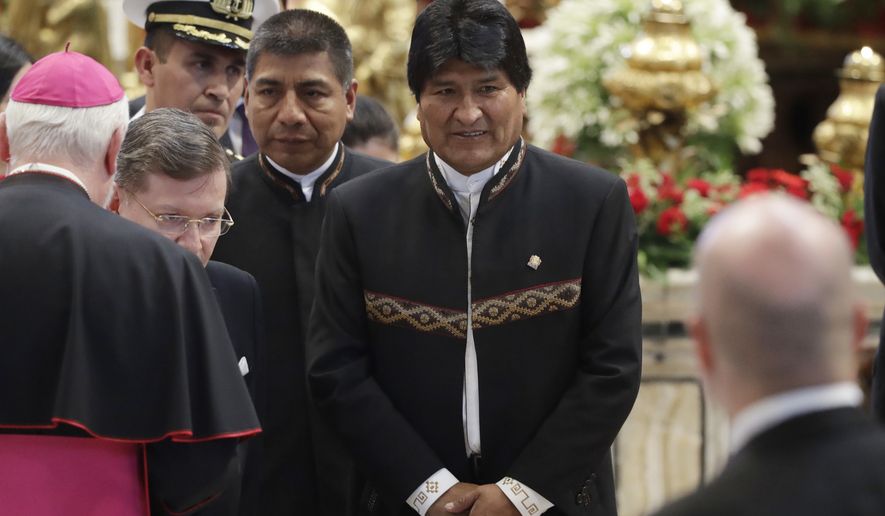SANTIAGO, Chile — Seeking to bolster the fortunes of their greatest champion, Bolivian coca growers have organized a social media offensive to silence critics of leftist President Evo Morales, who is seeking a fourth term in office despite the result of a 2016 referendum in which 51 percent of Bolivians rejected a proposal to drop term limits.
During his 12 years in office, Mr. Morales has legalized the cultivation of coca leaves used to make cocaine, expelled U.S. counternarcotics agents from Bolivia and showered the coca-growing valley of Chapare with major public works projects, including an international airport.
Landless peasant farmers, once targets of police persecution, have become one of the country’s most powerful special interest groups. They now say they want to return a favor to the president, a onetime coca grower and union leader.
Leonardo Loza, the head of a local federation of coca growers in Chapare, late last month inaugurated a “social media bunker” to “respond to lies of the opposition.”
The facility holds 17 computers and is staffed by an equal number of “cyberactivists,” Mr. Loza said. He told Bolivian reporters that coca-growing federations plan to install over 100 cybercenters to flood social networks such as Facebook and Twitter with pro-government messages.
Mr. Morales, Bolivia’s first indigenous president, enjoys generally favorable ratings beyond his political base. He has presided over a period of high economic growth in one of Latin America’s poorest countries and has tolerated an often shrill opposition.
But Mr. Morales’ strong support for Venezuelan socialist President Nicolas Maduro has created speculation that Caracas’ authoritarian model of government could spread to Bolivia.
Bolivians in 2016 unexpectedly rejected Mr. Morales’ proposal to scrap term limits and allow him to run for another five years, but the pro-government Constitutional Court overturned the popular verdict on grounds that it was an illegal “defamatory” campaign.
The whole episode gave a black eye to the government and the image of democracy in this country of 11 million.
“Evo Morales is manipulating the rules of the game and turning his back on human rights to cling to power,” Jose Miguel Vivanco, Human Rights Watch’s Americas director, tweeted in the wake of the decision to allow Mr. Morales to run again.
Mr. Morales will have an opportunity to win another presidential term when Bolivians vote in general elections next year.
Officials of Mr. Morales’ ruling MAS party said 80 youth activists have been trained as cyberwarriors through courses administered at the regional party headquarters in Cochabamba, the coca region’s main city. MAS defines its mission as “emitting information about the administration of President Morales, defending the extension of his mandate to 2025 and responding to the opposition.”
“There are characters in the opposition who circulate lies on social media, and we need to respond and debate them,” said Marco Choque, MAS national youth movement chairman.
Targeted Facebook and Twitter accounts, Mr. Choque said, include those of Samuel Doria Medina, who ran against Mr. Morales in 2014; Jorge Quiroga, who fought to preserve presidential term limits at the most recent constitutional convention; and Gov. Ruben Costas of the eastern province of Santa Cruz, a bastion of the opposition.
Trolls or volunteers?
Critics call them trolls, but government representatives say the pro-Morales cyberactivists are volunteers from social organizations who work with their cellphones and exercise their constitutional right to free speech and political activism. Their only compensation, the government claims: free meals.
But an investigation by opposition lawmakers showed that the social media strategy is directed by high-level bureaucrats in a new unit of the Communications Ministry.
Vice President Alvaro Garcia Linera blamed his government’s narrow defeat in the 2016 referendum on a hostile social media campaign and announced plans to fight for control of cyberspace.
The Directorate of Social Networks was subsequently formed with an annual budget of $300,000 and a multilayered bureaucracy running from network directors to unit chiefs to analysts and messengers earning salaries considerably above those of most Bolivian journalists.
Sen. Arturo Murillo of the opposition Democratic Unity bloc said the government is illegally subsidizing an unconstitutional political campaign with government revenue that could be used for other purposes, including shoring up the country’s troubled health care system.
Television journalist Carlos Valverde said the government’s cyberwar program is “a desperate effort to counter the opposition” and that attempts to hack into individual social media accounts could backfire.
Critics say the Morales government’s cybercampaign takes a page from Russian President Vladimir Putin’s social media strategy to covertly influence campaigns and elections in the U.S. and Western Europe. The Kremlin is accused of subsidizing cybernetic “troll firms” that promote the government’s positions online, with funding by business groups friendly to the Putin government.
Mr. Morales met with Mr. Putin in Moscow in May to discuss joint ventures for hydrocarbon exploration in Bolivia, whose natural gas reserves are the main source of government revenue. Russian oil company Gazprom controls 25 percent of a strategic Bolivian gas field supplying energy to Brazil.
A MAS party source said Russia is advising Bolivia on cyberwarfare and that an elite Bolivian team of hackers has gone to Moscow for special training.
The government’s campaign to recruit a cyberforce to win the social media debate is not without irony. Mr. Morales said “bad information” on opposition social media sites was the main reason that the 2016 referendum on term limits was defeated.
“How can it be that because of envy, particular groups, or interests foreign to those of Bolivia, people can produce lies, falsehoods, to hurt the country? They are not harming Evo but Bolivia,” he told reporters at the time.




Please read our comment policy before commenting.